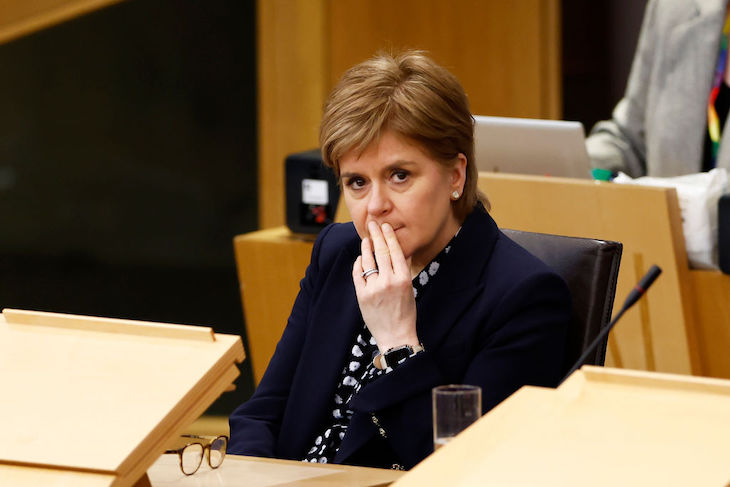Nicola Sturgeon’s arrest by police investigating the SNP’s finances would seem to be a gift to her opponents and those of her party. Labour, in particular, saw the weekend begin with the resignation of Boris Johnson, the man who drubbed them so thoroughly in 2019, and ended with police questioning the woman who seized almost all their Scottish seats in 2015.
Sir Keir Starmer is certainly having a remarkable streak of good fortune, though mostly because his rivals are seemingly bent on electoral self-destruction. Even so, it is unclear whether the woes beleaguering the Scots Nats will lead them into a similar political death spiral as that engulfing the Conservatives.
While political opponents savour the SNP’s troubles, polls suggest that schadenfreude might be a little premature. Consider three polling companies that have tested Westminster voting intentions since the former SNP chief executive (and Sturgeon’s husband) Peter Murrell’s arrest in early April. (I’m discounting a fourth, Ipsos, because prior to May it last polled this question in December.)
Polls suggest that schadenfreude might be a little premature
The first was YouGov, which put the SNP on 37 per cent in mid-April, within the margin of error of the 39 per cent recorded the previous month. Next came Redfield & Wilton, which polled Scottish voters at the start of May and later in early June, finding SNP support at 35 and 37 per cent respectively. Redfield’s pre-arrests polling had the Nationalists at 36 per cent. It was much the same story with Survation: 40 per cent in early April, 38 per cent in early May.
These are just a few polls and not enough to base a solid thesis on. We will need more opinion research before we can start drawing firm conclusions. But for now we can say this: if the arrests of senior SNP figures and attendant political difficulties have seriously shaken voters’ confidence in the party, it has yet to show in the polling.
This is counter-intuitive. Whatever the outcome of the Police Scotland investigation, we would expect to see a party going through such turmoil, and especially a party of government, to pay some penalty in the polls. So what gives? It could be a number of factors. For one, the SNP has a new leader, Humza Yousaf, and some voters may feel he deserves a fair chance to show what he’s made of. Another explanation is that the SNP is, as its slogan goes, ‘stronger for Scotland’ — the party you vote for to fight for Scotland’s interests. This is particularly important in a cost-of-living crisis and an economy where the pie seems to be getting smaller and smaller.
Nor can we discount the possibility that a segment of the Scottish electorate considers the police probe to be an attempt by the British state to destabilise the SNP and the independence movement. If that sounds fanciful, especially given policing is devolved to Holyrood, it’s important to note that conspiracism is a documented phenomenon within Scottish nationalism. Fifty-seven per cent of pro-independence voters believe Scotland’s public finance figures are ‘made up by Westminster to hide Scotland’s true wealth’. Those figures are, in fact, produced by the Scottish government.
Finally, Scots are conservative in their voting habits. First the Whigs, then the Liberals, then Labour and now the SNP have enjoyed prolonged periods of electoral hegemony. Between 1959 and 2010, Labour won the greatest number of Scottish seats in every single general election, regardless of the party’s national standing and without reference to local divisions and scandals. For large parts of the country, Labour was the ‘Scotland vote here’ party, a mantle that now belongs to the SNP.
Notice that we are talking about a straight transaction between the SNP and the voters. The opposition parties don’t even come into it. Well may they revel in the SNP’s misfortunes for they can do so with a clear conscience: they have contributed to them not one jot. Across 16 years in government almost every blow landed on the SNP has been self-inflicted.
Despite a policy record in which inertia is occasionally interrupted by fitful legislating, in which outcomes are so marked by failure that mere inputs are defined as victories, none of the opposition parties at Holyrood has offered Scottish voters a viable alternative. If either the Tories or Labour is a government-in-waiting, it’s not entirely clear what they’re waiting for.
The SNP’s long sojourn in power has been miserable for those who don’t want to see their country broken up. I don’t begrudge them a vicious smile at the woes of a party that has done so much to divide Scotland, poison its politics and coarsen its discourse. I just wonder what they have to show for it. The police investigation, the Gender Recognition Reform Bill, Isla Bryson, Sturgeon’s resignation, the fractious leadership contest, Humza Yousaf’s early stumbles, NHS waiting times, the ferries scandal, and the deposit return scheme. Despite it all, the voters may well stick with the SNP.
Unionists are dancing on the SNP’s grave while the party is still in its sick bed. What if it doesn’t die? What if all the investigative intrigue vanishes tomorrow? What if the Nationalists start climbing in the polls? What if Humza Yousaf’s approval rating continues to rise?
What then?






